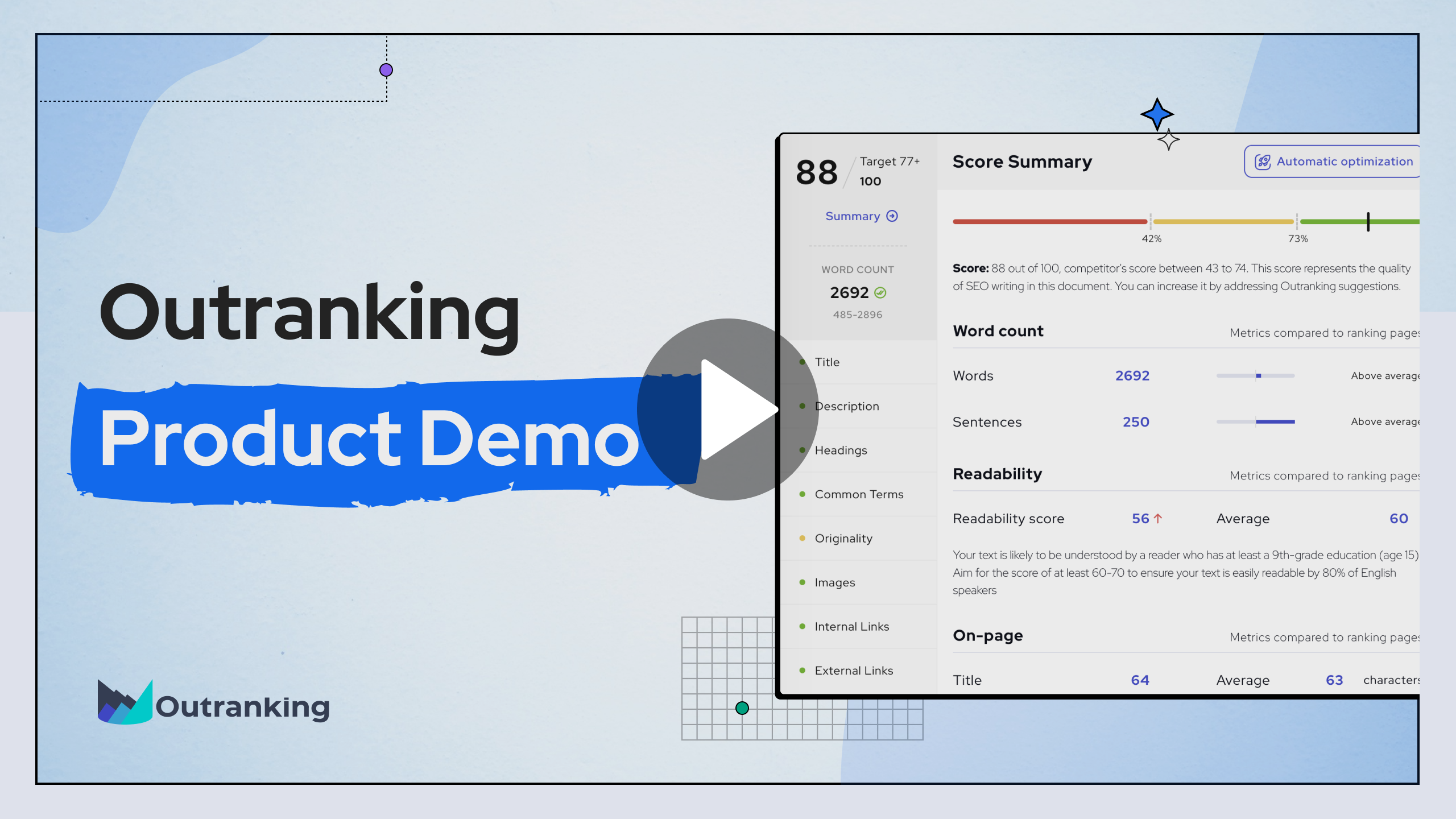- Product
- SEO Content Editor
- SEO Content Strategy
- Content Optimization
- Content Briefs
- AI Assisted Writing
- Keywords Clustering
Preview a demo walkthrough
Outranking the competition with our cutting-edge SEO strategies.

- Pricing
- Resources
- Sign In
- Get Started

What Is An SEO Analyst: A complete guide
Table of Contents
Table of Contents
What is an SEO analyst or specialist?
An SEO analyst is someone who helps sites rank higher in search engine results pages (SERPs). They use different techniques and strategies to improve a website’s visibility. This can involve working with software and using analytical skills to research the best ways to achieve a better ranking on search engines.
SEO specialists are hired to improve a website’s visibility and its ranking in search engines. Before hiring an SEO specialist, it is important to know what their services include and understand their pricing structure. Most SEO companies offer a variety of services, such as auditing websites, developing strategies, implementing changes, running tests, and analyzing and reporting campaign results. It is important for businesses to work with an SEO specialist who understands their business needs and can help them achieve the desired results.
What are the responsibilities of an SEO analyst?
An SEO analyst is responsible for many different tasks that ensure that a website is properly optimized. Some of these responsibilities include conducting keyword research, tracking important metrics, updating content, adding effective CTAs, optimizing pages for mobile devices, and implementing link-building strategies. The SEO analyst must also monitor paid search campaigns and stay current with new tools and practices in order to produce accurate explanations and specific action plans. Lastly, the SEO analyst is responsible for fulfilling reporting requirements by interpreting data to produce a meaningful analysis that can help strategists make decisions.
The responsibilities of an SEO analyst include:
- Researching the keywords, competitors, and backlinks of a website
- Creating content for the website
- Planning and conducting keyword research
- Writing copy for the website
- Creating and managing an SEO strategy
- Creating an SEO strategy document
- Creating and managing a content plan
What are the skills and qualifications of a good SEO analyst?
SEO analysts are responsible for analyzing organic search results in order to improve them by optimizing and tuning web pages. The main duties of SEO analysts include the following:
On-page search engine optimization
On-page search engine optimization is the practice of optimizing a website’s content and structure for the purpose of increasing its visibility in search engine results pages. On-page optimization is one of the most important aspects of SEO, and it involves optimizing a website’s title tags, meta descriptions, header tags, images, and other elements that affect how a site ranks in SERPs.
On-page optimization is essential for any website that wants to rank high in SERPs. Fortunately, it’s not difficult to do, provided you have the right tools and knowledge. When using Outranking’s business SEO platform for content optimization, you have both.
Check out how easy it is to do on-page SEO optimization when following our SEO AI step-by-step guide in this quick video walkthrough:
Off-page search engine optimization
Off-page search engine optimization (SEO) is the process of improving the visibility of a website in search engine results pages (SERPs) through external means. External means can include backlinking, social media engagement, and article submissions.
SEOs use a variety of techniques to improve the visibility of a website in SERPs. The goals of SEO and search engines are aligned, allowing you to create better web content that is easily found.
SEO analysts must be able to keep up with the changing search engine algorithms. Off-page SEO is an important part of any comprehensive SEO strategy, and it has successfully helped many businesses grow their online presence.
In this 1-minute video you’ll see how Outranking helps SEO analysts do content, SERP analysis, and Off-Page research, all in 1 tool:
Technical SEO
The skills and qualifications of a good SEO analyst include strong knowledge of SEO tools, functional knowledge of HTML coding and tags, understanding of the inner workings of search engines, web hosting skills to track website uptime and downtime, and knowledge of Google Analytics, SEM, and content marketing strategies.
Content planning and strategy
When creating and curating quality content, SEO analysts are responsible for the following:
Defining search marketing strategies: This includes understanding the business goals and identifying the target audience.
Assessing websites: Analysts need to be able to evaluate how well a website is optimized for search engines and identify any areas that need improvement.
Recommending keywords: Keyword research is essential for effective SEO content strategy. Analysts must understand which keywords will have the most impact on their target audience.
Creating a content publishing plan: Analysts need to recommend the kind of content that is needed, how often the content should be published, and who should publish it.
Website audit
An SEO audit is a systematic way of assessing the site’s SEO. The goal of an audit is to identify and fix any problems with a site’s SEO.
SEO audits can help you understand how your site is performing relative to other sites and learn what needs to be improved.
A good SEO analyst has a system that allows them to execute audits quickly and efficiently. The job of an SEO analyst is divided into steps that are documented and shared between team members.
Traffic and site data analysis
In order to understand how well their website is performing, SEO analysts use various tools to track website traffic. These tools include Google Analytics and SEMrush, as well as SpyFu and Ahrefs.
By tracking different dimensions of website traffic, such as unique entrances, time spent on specific pages, organic traffic, acquisition types, sources, and marketing campaign successes and failures, SEO analysts are able to develop a comprehensive understanding of how people are interacting with their site. They can then use this data to make suggestions for improvement to the website’s functionality.
Additionally, SEO analysts study data on a website’s unique visitors, repeat visitors, time spent on pages, and traffic sources in order to better identify what content or products would be most relevant and engaging to their target audience. This information allows businesses to focus on making their websites more user-friendly in order to achieve their ultimate goal: increased visibility and growth.
Google Analytics, Search Console, and Keyword Tools
In order to optimize a website for better search engine performance, SEO analysts use a variety of data analytics tools on a daily basis. These data tools include:
Google Analytics: This is a free web analytics service offered by Google that tracks and reports website traffic.
Search Console: This is a free webmaster tool offered by Google that helps you track your website’s search engine visibility and performance.
Keyword Tools: There are many different keyword research tools available, such as the Google AdWords Keyword Planner, Semrush, Moz, and Ahrefs. These tools allow you to find keywords relevant to your business and measure their monthly search volume.
SEO analyst or specialist job description
If you’re passionate about technology and digital marketing, then a career as an SEO analyst may be perfect for you!
SEO analysts’ responsibilities involve conducting keyword research, monitoring website traffic, and developing improvement strategies. They also have the responsibility of attracting and retaining customers through effective online marketing.
The ideal candidate should be able to identify marketing opportunities and come up with strategies to increase website traffic. Furthermore, they should be able to communicate effectively with clients and team members in order to get the most out of their working relationships. Passionate individuals who love keeping up to date with the latest trends in SEO will excel in this field.
Some examples of SEO analyst job descriptions from job boards
One posting on Glassdoor with a salary range of $60k-$107k requires close collaboration with engineering, product, and design teams to improve UX and SEO. The analyst needs to plan, execute, and measure programs, analyze large datasets and build business cases. They must also build reporting dashboards and visualize data as part of a cross-functional team. Finally, they must collaborate with content writers to support and ensure the production of high-quality content.
Another posting on Indeed with a salary range of $73k-$92k requires research, analysis, and reporting skills. The analyst must use tools such as Google Analytics, Google Search Console, and Google Ads Keyword Planner to identify opportunities. They must also do technical site audits and work on a growth team that includes SEO, content production, and public relations. The position also includes a constructive review of colleagues’ work and requires at least three years of SEO experience.
How to become an SEO analyst?
Start by learning the technical aspects of the industry, such as the various tools and techniques used to rank sites in search engines. You can also learn to develop an SEO strategy, which involves the use of specific keywords and phrases to rank for the most relevant keywords.
There are many ways to become an SEO analyst. The most common way is to pursue a bachelor’s degree in one of the following fields: business, marketing, journalism, communications, computer science, information systems, or statistics. However, there are many other paths you can take.
Some employers may require specific qualifications, such as a certification in Google AdWords or experience with certain software programs. To work in some areas of SEO, you may need to be familiar with languages such as HTML and CSS.
The best way to become an SEO analyst is by taking relevant courses that give you the necessary foundation. There are various certificate courses in SEO, which teach students how to optimize a website for search engines. After completing a certificate in SEO, students can become an analyst or take another position in the field of search engine optimization.
What are the job prospects or outlook for SEO analysts?
SEO analyst career options are generally very good, with a wide variety of jobs and industries to choose from. The future job outlook for SEO analysts is very good, with an expected growth of 12% in the next couple of years.
This field is growing, and businesses are hiring for this position. As a highly in-demand profession, the future looks bright for those who enter this career. The average salary for an SEO analyst in the US is about $73k. This number is expected to grow as more businesses recognize the importance of search engine optimization (SEO).
Upgrading your career is easy and straightforward if you have the passion and skills required to learn the best SEO practices. Becoming an SEO analyst will help you establish a name for yourself in this field. With experience, you may even move up to a managerial position. If you’re looking for a stable and lucrative career, becoming an SEO analyst is a great option!
Tools you should learn to become an expert SEO analyst
Outranking for on-page optimization
Outranking guides you step by step on how to create pages with optimized on-page SEO elements or upgrade existing content for SEO. The live scoring feature updates automatically, allowing you to track the impact of your changes in real-time. Outranking is also an AI SEO content marketing tool if you want to step up your content marketing game. Try it for free today!
SEMrush or Ahrefs for keyword research
These pages allow you to research and track keywords for SEO. However, Outranking already has an integration with SEMrush built-in.
Google Analytics and Search Console
Google Analytics allows you to track website traffic, while Search Console is focused on managing and optimizing traffic for your own web page.
Google PageSpeed Tools
Slow pages are more likely to make your visitors bounce. Google offers this set of tools, including the PageSpeed Module, Insights, Service, and Chrome Devtools extension, to optimize the loading speed of your website.



